About the Program
One position is available for an applicant interested in obtaining fellowship experience in cornea, external disease, refractive surgery, and anterior segment medicine and surgery. The fellow will work with Dr. Mark Greiner, Dr. Kanwal Matharu, and Dr. Christopher Sales.
The Cornea Service at University of Iowa Health Care, Department of Ophthalmology and Visual Sciences, manages a wide variety of medical and surgical problems related to the anterior segment. The fellow will be given an opportunity to progress as rapidly as possible commensurate with their ability. The goal of the fellowship is to train the individual to successfully manage a referral cornea practice in an academic or private setting. In addition, the fellow’s teaching capabilities will be developed by working closely with residents and faculty.
Ample opportunity to engage in clinical research projects and to pursue additional laboratory research is also available depending upon the interest and previous training of the fellow. Current research investigation areas include endothelial keratoplasty, surgical outcomes, microbial keratitis, ocular surface disease, confocal microscopy, corneal topography, refractive surgery, diabetes and glaucoma related corneal dysfunction, and eye banking science.
The fellow will obtain surgical experience during the year and will perform surgery with increasing autonomy as their skills progress. Experience in refractive surgery techniques is also an important part of the training.
The University of Iowa Cornea Fellowship has a long history of training fellows for academic careers as well as private practice. The wealth of clinical material and excellent referral system at the University of Iowa enables the fellow to care for an unusually broad range of patients and offers an excellent opportunity for acquiring skills and experience needed to master this subspecialty.
The University of Iowa Health Care is at the heart of Iowa City, a thriving Midwestern university town. Iowa City is routinely ranked as one of the safest, healthiest, most livable, most educated and most economically viable cities in the country. Because fellows function as junior faculty, fellows are required to obtain a Permanent Iowa State Medical License and to staff anterior segment on-call cases. We will not be sponsoring any visas for this application year. Our Cornea Fellowship is AUPO FCC approved.
![]() Our Cornea Fellowship is AUPO FCC approved.
Our Cornea Fellowship is AUPO FCC approved.
Welcome
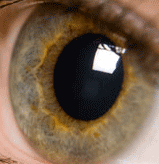
The University of Iowa Cornea Fellowship has a long history of training fellows for academic careers as well as private practice. The wealth of clinical material and excellent referral system at the University of Iowa enables the fellow to care for an unusually broad range of patients and offers an excellent opportunity for acquiring skills and experience needed to master this subspecialty.
The Cornea Service at the University of Iowa Hospitals & Clinics, Department of Ophthalmology and Visual Sciences, manages a wide variety of medical and surgical problems related to the anterior segment. The fellow will be given an opportunity to progress as rapidly as possible commensurate with their ability. The goal of the fellowship is to train the individual to successfully manage a referral cornea practice in an academic or private setting. In addition, the fellow’s teaching capabilities will be developed by working closely with residents and faculty.
Research Training
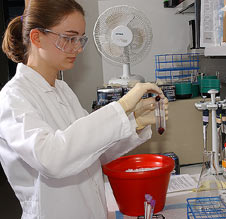 Each ophthalmology fellow is expected to complete a research project based on clinical or laboratory experience. Research is usually performed within the department, but can take place in another department or, occasionally, at another institution. The research interests of the faculty are varied, and many projects are in progress. Presentations of research are made annually during the Resident/Fellow Research Conference at the end of the academic year. The P.J. Leinfelder Award is given annually by a faculty committee to the fellow who has made the most significant contributions in preparing and delivering their research.
Each ophthalmology fellow is expected to complete a research project based on clinical or laboratory experience. Research is usually performed within the department, but can take place in another department or, occasionally, at another institution. The research interests of the faculty are varied, and many projects are in progress. Presentations of research are made annually during the Resident/Fellow Research Conference at the end of the academic year. The P.J. Leinfelder Award is given annually by a faculty committee to the fellow who has made the most significant contributions in preparing and delivering their research.
- Visit our most recent Resident/Fellow Research Day program for examples of typical areas of research interest.
- About the University of Iowa Institute for Vision Research
Rounds, Lectures, and Conferences
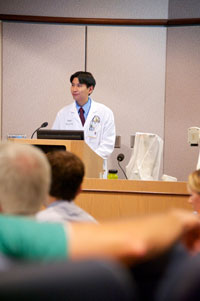
Morning Rounds are held Monday through Thursday from 8:00 a.m. to 8:40 a.m. in the Braley Auditorium. All residents and staff attend unless operating or engaged in acute medical care. During rounds, residents and fellows develop their public speaking skills by making presentations. Discussion by the faculty and house staff will follow each case.
The cases and discussions presented by residents and fellows at Morning Rounds are often further developed and published as case reports and tutorials on EyeRounds.org.
Afternoons are, in general, reserved for rotation-specific conferences. Some services such as glaucoma, cornea, neuro-ophthalmology, and pediatric ophthalmology have "chart rounds". These conferences focus on interesting patients that presented that day. Discussions center on patient care but also cover other areas such as communication, ethics, and systems based care. Other services such as retina have formal conferences, such as Fluorescein conference on Monday afternoons, and Dr. Ed Stone's molecular ophthalmology rounds on Tuesday nights.
Afternoons are reserved for rotation-specific conferences. Some services such as glaucoma, cornea, neuro-ophthalmology, and pediatric ophthalmology have "chart rounds". These conferences focus on interesting patients that are presented that day. Discussions center on patient care but also cover other areas such as communications, ethics, and systems-based care. Other services, like retina, have formal conferences, such as Fluorescein Conference on Monday afternoons, and Dr. Ed Stone's Molecular Ophthalmology Rounds on Tuesday nights.
Once a week during the academic year, didactic lectures on ophthalmology are presented. These two-hour lectures are organized to coincide with the American Academy of Ophthalmology’s Basic and Clinical Sciences Course. Lectures cover most aspects of basic and clinical ophthalmology. Once every ten weeks these sessions include a journal club covering recent journal articles in that subject area to help develop skills in practice-based learning.
Six, day-long clinical conferences are held during the academic year. Clinics are closed on these days. Ophthalmologists from Iowa and Illinois attend and present challenging clinical problems for discussion by faculty and guests. These meetings feature a visiting professor who presents a lecture based on their research interests. The day is balanced by the presentation of a more clinically oriented topic. This conference has contributed to the excellent rapport between practicing ophthalmologists and the ophthalmology staff at the university.
Each year in June, alumni and other members attend a two or three day Iowa Eye Association meeting with invited speakers and a focus on a specific subspecialty topic.
Duties and Activities
Education
The fellow is in clinic or in surgery with the faculty Monday through Friday.
Friday mornings are devoted to resident lectures where the fellow may participate and attend as desired in preparation for their oral boards.
The Cornea Fellow provides a one-hour conference on slit lamp cases once a month and participates in Cornea and Refractive Surgery Grand Rounds approximately six times a year.
Call
Weekend and evening call involves covering the Cornea and External Disease call when faculty are out of town; this happens infrequently during the year with no more than 20 days required. The fellow has an obligation to cover Comprehensive/General Ophthalmology call twice a year to allow time for the residents to participate in the Ophthalmic Knowledge Assessment Program (OKAP) Examination or the Cataract Surgery Course.
Meetings
The fellow attends any meetings of the Midwest Academic Refractive Consortium (MARC), whether it is held in Iowa City or one of the other centers, such as Kansas City with Dr. Durrie’s office.
The daily schedule is as follows:
2020-2021 Fellow Schedule:
Monday-Thursday
Morning Rounds
8:00 a.m. to 8:40 a.m.
Monday
Cornea Clinic
8:40 a.m. to 5:00 p.m.
Tuesday
Cornea Clinic with Dr. Greiner or Laser Refractive with Dr. Sales
8:00 a.m. to 5:00 p.m.
Wednesday
Surgery with Dr. Greiner
7:00 a.m. to 5:00 p.m.
Thursday
Surgery with Dr. Sales, or Cornea Clinic with Dr. Greiner
7:00 a.m. to 5:00 p.m.
Friday
Cornea Clinic with Dr. Sales, or Laser Refractive:
8:30 a.m. to 5:00 p.m.
Saturday
on call rotation
Sunday
on call rotation
About the Fellowship
One position is available for an applicant interested in obtaining fellowship experience in cornea, external disease, refractive surgery, and anterior segment medicine and surgery. The fellow will work with Dr. Mark Greiner, Dr. Kanwal Matharu, and Dr. Christopher Sales.
The Cornea Service at University of Iowa Health Care, Department of Ophthalmology and Visual Sciences, manages a wide variety of medical and surgical problems related to the anterior segment. The fellow will be given an opportunity to progress as rapidly as possible commensurate with their ability. The goal of the fellowship is to train the individual to successfully manage a referral cornea practice in an academic or private setting. In addition, the fellow’s teaching capabilities will be developed by working closely with residents and faculty.
Ample opportunity to engage in clinical research projects and to pursue additional laboratory research is also available depending upon the interest and previous training of the fellow. Current research investigation areas include endothelial keratoplasty, surgical outcomes, microbial keratitis, ocular surface disease, confocal microscopy, corneal topography, refractive surgery, diabetes, and glaucoma related corneal dysfunction, and eye banking science.
The fellow will obtain surgical experience during the year and will perform surgery with increasing autonomy as their skills progress. Experience in refractive surgery techniques is also an important part of the training.
The University of Iowa Cornea Fellowship has a long history of training fellows for academic careers as well as private practice. The wealth of clinical material and excellent referral system at the University of Iowa enables the fellow to care for an unusually broad range of patients and offers an excellent opportunity for acquiring skills and experience needed to master this subspecialty.
![]() The University of Iowa Health Care is at the heart of Iowa City, a thriving Midwestern university town. Iowa City is routinely ranked as one of the safest, healthiest, most livable, most educated, and most economically viable cities in the country. Because fellows function as junior faculty, fellows are required to obtain a Permanent Iowa State Medical License and to staff anterior segment on-call cases. We will not be sponsoring any visas for this application year. Our Cornea Fellowship is AUPO FCC approved.
The University of Iowa Health Care is at the heart of Iowa City, a thriving Midwestern university town. Iowa City is routinely ranked as one of the safest, healthiest, most livable, most educated, and most economically viable cities in the country. Because fellows function as junior faculty, fellows are required to obtain a Permanent Iowa State Medical License and to staff anterior segment on-call cases. We will not be sponsoring any visas for this application year. Our Cornea Fellowship is AUPO FCC approved.
FAQs
Where is Iowa City?
Iowa City is 220 miles directly west of Chicago on Interstate 80. It's also within a 4 to 5 hour drive to Milwaukee, Madison, Minneapolis, Omaha, Kansas City and St. Louis. It has the cultural, educational, social and political opportunities of a bigger city with the values and ambiance of a midwestern town. It's clean, safe, nothing is farther than a 15 minute car ride, it has a great city bus system (with bike racks!), wonderful parks, bike and hiking trails, sports, schools and even sailing. Those who have lived here and left, frequently return because what they were looking for was in their own back yard. The metropolitan statistical area population is somewhere in the neighborhood of 160,000 people with about 73,000 of those within the Iowa City city limits. (2013 census data).
What's the weather like in Iowa City?
For about two weeks every winter it's very cold and windy and for two weeks every summer it's really hot and humid. The rest of the time it's pretty nice. We consider our weather character building.
- The average warmest month is July and the coolest month is January.
- The average temperature in the summer is 72.6 and in the winter, 23.7.
- Average number of sunny days is 166.
- The highest recorded temperature was 104°F in 1988.
- The lowest recorded temperature was -26°F in 1996.
- The maximum average precipitation occurs in August, average annual rainfall is 35".
- Average snowfall is 28" (with an average of 16 days of measurable snowfall per winter).
What is there to do in Iowa City when you're not working?
There are 15 different festivals and art fairs, plus concerts and race events. There are many music venues, sports events and neighborhood street fairs and garden walks. We also have a really big mall and several smaller ones, 50 parks, 9 golf courses, 6 public tennis courts, 6 public pools, some lakes and a reservoir with trails, camping & boating. There are hiking and bike trails, some famous bookstores, a ton of galleries and excellent museums. There are half a dozen or more performing arts venues. There's always something going on.
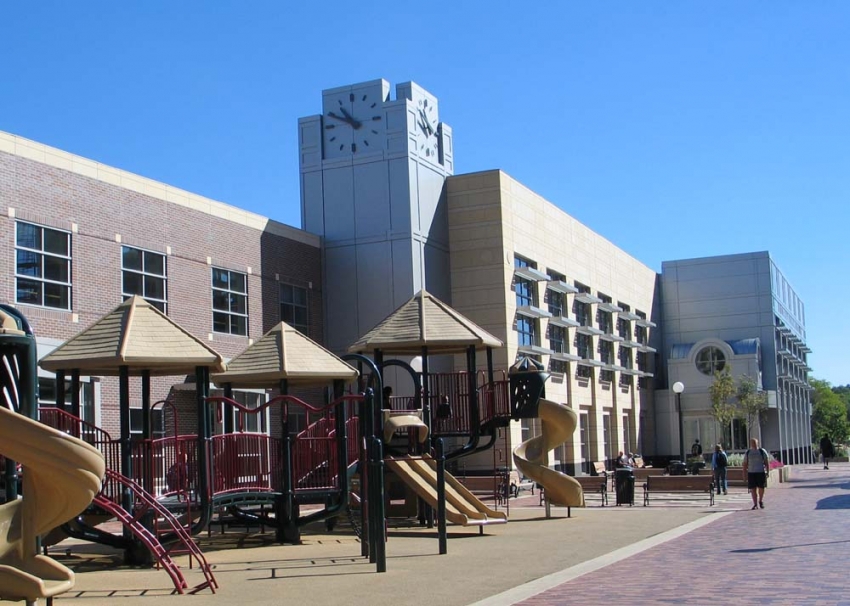 What's Iowa City like for kids and families?
What's Iowa City like for kids and families?
There's ice skating, bowling, organized sports, public parks, miniature golf, a great public library, a toy library, fun centers, swimming pools and 3 beaches, 9 museums including a children's museum, dance companies and public recreation centers that feature many activities for kids and families at little or no cost. We also have 20 movie screens and 50-licensed daycare providers. The Iowa City schools are perennially ranked among the top schools in the nation. Iowa City is unique in the facilities and services available for individuals with disabilities. Many families who have a family member with a disability are reluctant to leave Iowa City because they cannot duplicate those services in another location.
Are there any job opportunities for my spouse/significant other?
Yes, in April 2016, Iowa City had an average of 2.3% unemployment (compared to 5.5% nationwide). Also check out University of Iowa's Dual Career Network.
How ethnically diverse are the patients?
Like a lot of university towns, we have a large international community. Growing cultural diversity is another reason Iowa City is an interesting place to live. Diversity is embraced and celebrated with city and university events, festivals, clubs and programs. The University works hard to recruit and retain minorities with its affirmative action policies. About 15% of Iowa Citians are non-white, this percentage is paralleled in our clinics.
What are the fellowship opportunities available?
Ten to 12 fellows train in our accredited fellowship programs each year. We have fellowships in all of our sub-specialty areas. Most are one-year fellowships but 2-year fellowship opportunities are available as well.
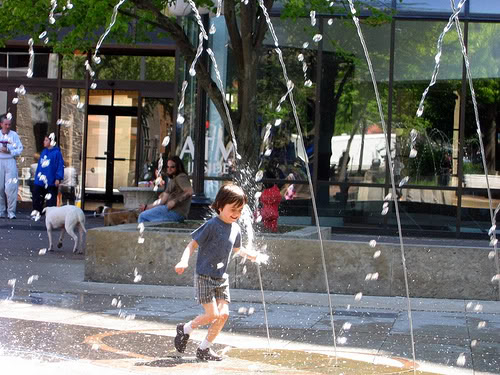 Is this a family friendly program?
Is this a family friendly program?
We love children and support residents and fellows in their efforts to balance work with family life. We have several dual physician families and understand the stresses. Women receive up to 6 weeks of paid maternity leave after delivery. Men get 5 working days off for paternity leave. There are several childcare facilities near the hospital and one on-site. The training program also has activities during the year where all family members are invited.
Is there sufficient patient volume so that I can have multiple exposures to a variety of eye diseases and conditions?
Our patients represent all age groups and all socioeconomic strata and they present with virtually all acute and chronic conditions of the eye.
The UIHC is a tertiary care center and our department receives referrals for specialized services from Iowa and neighboring states. Some patients travel from outside the continent to be seen by our physicians.
In an average year, patient visits per sub-specialty are approximately:
- Cornea: 7,000
- Comprehensive Ophthalmology: 13,000
- Glaucoma: 6,000
- Neuro-Ophthalmology: 3,000
- Oculoplastic Surgery: 4,700
- Contact Lens: 4,500
- Pediatric Ophthalmology: 8,000
- Retina/Vitreous: 16,000
- Vision Rehabilitation: 2,800
- Other: 500
Is there a research requirement for graduation?
Participation in research is an integral part of the training experience. Projects may be done in collaboration with a faculty preceptor who will be involved in all phases of the project. Each fellow presents the results of his/her research at the department's resident and fellow research day.
What's so good about Iowa?
- Our faculty are really nice, and exceptionally dedicated teachers too.
- We have a diverse faculty with wide-ranging clinical and research interests.
- Some of our faculty are internationally known and have been with us for many years.
- We also have several bright young faculty who bring new interests and enthusiasm to the practice.
- All the subspecialties are represented in our training program.
- Our programs, clinical and teaching are consistently ranked in the top ten nationally.
- Our residents are great people and they make exceptional ophthalmologists.
- Iowa City is a highly intellectual community with premier arts events that are accessible to residents both in terms of cost and location.
- We have an outstanding school system for children in grades K-12.
- A great training program and a high quality of life.
- We want you to succeed.
Quick Facts
Benefits
- Competitive Stipends
- Comprehensive medical, dental, hospitalization and pharmacy benefits for residents/fellows and their dependents
- Vacation each year: 3 weeks, for specific information Paid Time Off and Leave Information
Board Certification Requirements
- While Ophthalmology, as a specialty, is board certified, Ophthalmology subspecialty fellowships are not board certified. Visit the American Board of Ophthalmology for specifics on board certification requirements.